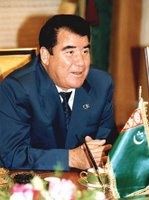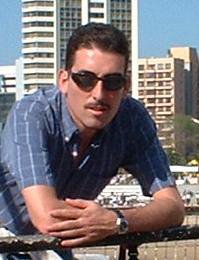Turkmenistan -- Discreet Troublemaker

It´s a place where an authoritarian government turns a blind eye to tons of heroin that heads north to Russia and Western Europe. It´s a country where radical Islamic fundamentalism is growing, paving the way for Al Qaeda to form another base from where to operate. And it´s one of the last nations in the world whose leader enjoys the reverence of his people by imposing a ruthless personality cult worship.
Turkmenistan, a former Soviet republic, could be the next threat for peace and security in the Middle East. This Central Asian nation of about 5 million on the Caspian Sea, which borders Iran and Afghanistan, has been a behind-the-scenes agitator in the volatile confrontation between the United States, Iran and Islamic extremists. Eighty-nine percent of the population is Muslim. Outside religious groups, such as Orthodox Christians, have criticized the United States for failing to include the country on a watchdog list of nations where religious freedoms are being curtailed. The Russian Orthodox Church, whose membership accounts for about nine percent of the population, says the Turkmen government does not allow it to practice openly.
In 1995, Turkmenistan declared its neutrality from regional conflicts, which was recognized by the United Nations. During the Afghan war, many Taliban and Al Qaeda leaders fled to Turkmenistan where they were given safehaven. Intelligence analysts believe that the Turkmen government of President Saparmurat Niyazov (above left) is allowing guerilla forces use his country to disrupt the fledging democratic process in Afghanistan. "Allah is your creator and the motherland is your defender," Niyazov oftens states. Niyazov´s reported take is a profitable portion of illegal heroin industry initiated in the poppy farms across Afghanistan. According to the CIA World Factbook, Turkmenistan has become an important transit country for Afghan narcotics bound for Russia and West European markets. It is also a transit point for heroin precursor chemicals headed toward Afghanistan.
Elected in 1990, Niyazov rules Turkmenistan with a heavy hand. Foreign visitors are often trailed and under suspicion. To obtain a tourist visa, a visitor must have a letter of invitation from a person or an entity inside the country, which is then registered with the government. The BBC World Service on Thursday broadcast a lengthy report about the crumbling health care system in Turkmenistan. According to the BBC reporter, who entered clandestinely, there is a shortage of doctors because many have left the country. Drugs are also scarce because the government has allotted no money to the health system. Many sick and dying risk their lives to escape across the restricted border to neighboring Uzbekistan.
While his people face severe hardships, the narcistic Niyazov continues to impose a cult worship. Bronze statues and oil paintings of the 65-year-old, jet-black dyed-hair president are everywhere. Textile factories, schools, farms and even the international airport in the capital of Ashgabat are named after him. He has even erected a statue of his mother holding him in his arms when he was a baby. In 1999, the People´s Council unanimously approved him president for life. The country´s beleaguered opposition in exile was dealt a stunning blow in 2002 when Niyazov had who he believed was his main rival, then-Foreign Minister Boris Shikhmuradov, thrown in prison following an assassination attempt on the president´s life.
As President Bush continues to propound an axis of evil between nations like Iran and North Korea, policy makers cannot overlook countries like Turkmenistan that operate from behind the curtains on the international stage of confrontation. With more exposure and publicity about the dealings of these little-known countries, international pressure could help curtail what could become another quandary in a perlious region.


0 Comments:
Post a Comment
<< Home